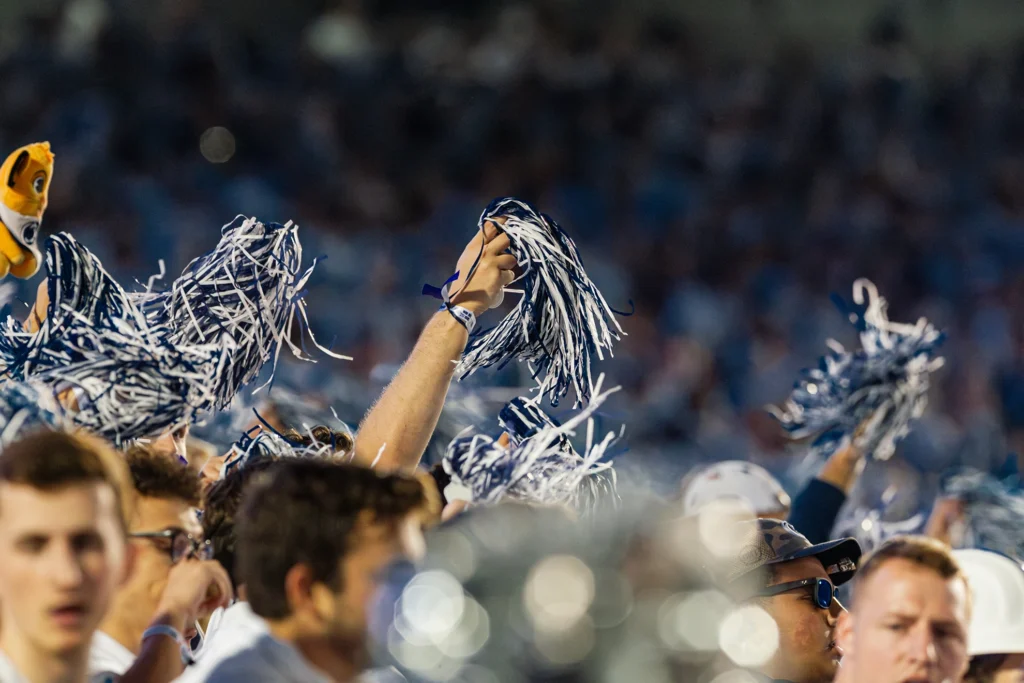
Penn State’s player talent fee is here. Just don’t call it that.
Seriously. It’s not a player talent fee.
That’s what the FAQs say. The small, manageable increase that is coming to ticket invoices is not a player talent fee.
Definitely not that.
It is however a fee that’s coming to help combat the rising costs that will be the result of the House decision, which will force college athletic departments to share revenue with its student-athletes – who have the talents to bring those athletic departments boatloads of money.
Whatever we’re calling it – or allowed or supposed to call it – Penn State’s player talent fee is here, and we’re starting to get a better picture of how this will impact fandom.
On Friday morning, Penn State launched the Legacy Fund which is, according to the press release, “a two-pronged effort providing resources for student-athlete scholarships and a commitment to ensuring Penn State’s 23 athletics facilities, including Beaver Stadium, remain some of the best venues in the nation.”
What it really means is that Penn State is showing how it’s going to combat the rising costs it takes to run an athletic department as the House settlement, which will allow schools to spend up to $20 million per year of shared revenue with student-athletes, comes to due.
Or in even more layman’s terms, Penn State needs to find a way to scrape a few more bucks without saying it is directly raising your ticket prices to cover the expansive cost of being one of the country’s largest athletic departments. In 2023-24, that took $215M and with the House settlement, it will cost even more.
Or in even simpler terms, Penn State has a player talent fee.
Except, when you go to the FAQ document about the Legacy Fund, you’ll find this:
Is this a player talent fee? If not, how is it different?
"No, this is not a player talent fee. The purpose of the Legacy Fund is to provide resources for student-athlete scholarships and a commitment to ensuring Penn State’s 23 athletics facilities remain some of the best venues in the nation.” It’s hard not to roll your eyes at that part.
We’re all adults here. We’re all aware that the future of college athletics is going to cost more money and you’re doing this directly because you have to pay players.
In general, I’m fine with it. I think a lot of people are fine with it.
Ethically, I’ve always struggled with the fact that student-athletes couldn’t make money off of themselves when any other student can. I also struggled with the fact that student-athletes are massive brand-awareness machines for universities writ large, and they weren’t seeing much return from that. (Yes, some but not all of them are getting great educations with little-to-no student debt but again, Penn State made nearly a quarter of a billion dollars last year.)
I also appreciate the fact that Penn State is being more upfront about it – even with its clever PR ways.
In the press release, Penn State says fans will see “nominal increases” to “season and single-game tickets for all” sports, but in the FAQs, there’s confusing language.
One question included is whether or not season ticket prices will go up. It’s answered with this language: “… Additionally, football season ticket prices will remain flat through the 2026 season.”
However, in the very next answer to a question about how much the contribution is, we get this answer:
“For football, season ticket accounts will see a line item reflecting a $20 contribution applied to each season seat for the regular season. Likewise, for football season parking, account holders will see a $45 fee applied to each season parking pass.”So it is going up.
The cost of my season tickets is what I’m paying in total when I hit checkout on Ticketmaster. This is why millions of people hate Ticketmaster — or anyone who sells tickets that have fees associated with the purchase.
It’s not like you can opt out of paying that extra $20 per seat and $45 if you’ve got a parking pass. That price is my ticket cost, even if we’re coming up with clever names for the fees.
So call it what it is.
The price point is no issue. The sum of $20 per seat plus $45 parking is not an earth-shattering, making-or-break amount. I’m fine with paying it but in the sense that this is also a player talent fee, don’t play little games with it.
Be direct and more upfront.
And in fairness, this is much better communication than the lack of communication every season ticket holder got last year when Nittany Lion Club fees went up. At minimum most people saw a $100 per seat increase, which is fine given the rising costs of everything. But it felt snuck into the bill.
Now, there’s at least open communication — even if it’s not clear — this time around.
But let’s quit the silly PR games.
We’ll still gladly fork the money over whatever you decide to call it so let’s just call it what it is.
If you’ve enjoyed this content, please subscribe to Stuff Somers Says With Steve on YouTube. Or join our newsletter by entering your email below.
